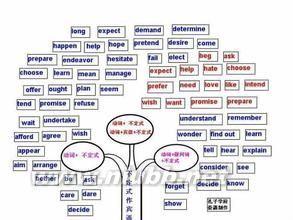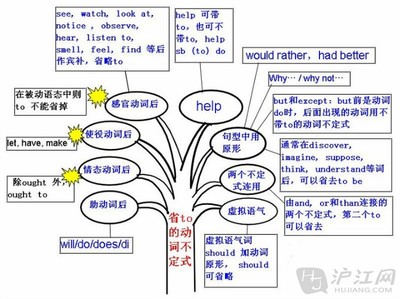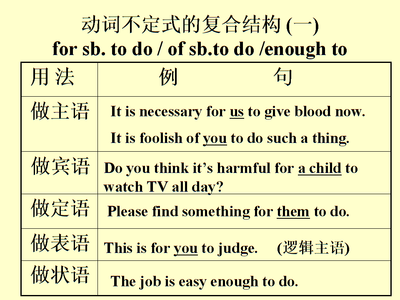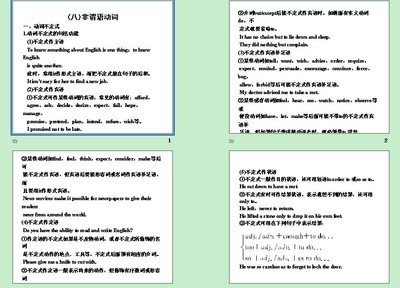在语法中,动词不定式是指动词的一种不带词形变化从而不指示人称、数量、时态的形式。它之所以被叫做不定式,是因为动词不被限定,或者说不被词形变化所局限。不定式属于非谓语动词。然而在一些语言里(例如葡萄牙语),存在着受时态、人称和数量影响的不定式形态。亦有些语言完全没有不定式,例如阿拉伯语、保加利亚语和现代希腊语。在外语学习的课程中,动词不定式的一般现在时被称作“词典用词”,因为它一般被用作词典中该动词的词头。对于英语来说接不定式的单词多为“打算”“计划”“希望”等表示未来的动词。同样与不定时表示不同的动词不定式表示正在进行,一般性或经常发生性的行为。动词不定式可以作以上各种成分,但它毕竟是动词,所以有动词的属性。动词不定式及其短语还可以有自己的宾语、状语,虽然动词不定式在语法上没有表面上的直接主语,但它表达的意义是动作,这一动作一定由使动者发出。这一使动者我们称之为逻辑主语。
动词不定式_动词不定式 -简介
动词不定式
1.不定式定义:
不定式是一种非限定性动词。而非限定动词是指那些在句中不能单独充当谓语的动词,可分为不定式,动名词,现在分词和过去分词。
2.用途:
在句中不能作谓语。它具有动词的性质,本身可以带宾语和状语。
3.形式:
动词 + 不定式:由to+动词原形构成。
afford aim appear agree arrange ask be decide bother care choose come dare demand desire determine expect elect endeavor hope fail happen help hesitate learn long mean manage offer ought plan prepare pretend promise refuse seem tend wait wish undertake
动词不定式在句中可以作句子任何成分。动词不定式的被动形式除了一般形式外还有其完成式和进行式。
动词不定式_动词不定式 -作定语
⒈不定式作定语
不定式在句中作定语,置于被修饰的名词或代词之后。如:
①The next train to arrive is from Washington.
②Do you have anything to be taken to your sister?
③Do you have anything to say on the question?
④Would you please give me some paper to write on?
⑤My wish to visit France has come true at last.
不定式短语作定语和被修饰词之间表示以下关系:
(1)表示将来的动作(例①)。
(2)与被修饰词之间有动宾关系,如是不及物动词,则需加介词(例④)。
(3)与被修饰词之间有动宾关系,同时与句中其它词之间又有逻辑上的主谓关系时,尽管有被动含义,却仍 用主动语态(例③);如只有动宾关系,而无逻辑上的主谓关系,则需用被动语态(例②)。
(4)不定式作定语时,一般可转换为定语从句,例①to arrive=that will arrive。
动词不定式_动词不定式 -区别联系
1动名词与不定式的区别
动名词表达的是:状态,性质,心境,抽象,经常性,已发生的不定式表达的是:目的,结果,原因,具体,一次性,将发生的
2接不定式或动名词,意义相同
3在下列情况下,一般要用不定式:
①hate,like,love前有would(should)时,如:I'dliketohaveacupofcoffee.
②当谓语动词begin,continue,start等是进行式时,如:Thestudentsarestartingtoworkonthedifficultmathsproblem.
③begin,continue,start与know,understand等状态动词连用时,如:Isoonbegantounderstandwhatwashappening.
⒋advise,allow,encourage,forbid,permit等动词后接动名词作宾语,或带不定式作宾语补足语。如:
Ourteachersdon'tpermitour/usswimminginthelake.
Ourteachersdon'tpermitustoswiminthelake.
4部分动词后接不定式或动名词时,意义差别较大,应根据句子语境选择使用。
①forget,remember,regret后接不定式,表示现在或未来的动作,接动名词表示动作已经发生。如:
Don'tforgettoposttheletterforme.
HaveyouforgottenmeetingherinBeijingAirport?
Remembertoclosethewindowsbeforeyouleave.
Irememberwritinghimaletterayearago.
Weregrettotellyouthatallofyouarenotinvitedtoattendthemeeting.
Theyregrettedorderingthesebooksfromabroad.
语义不同
目录
1stop to do(停止做某事)stop doing(停止正在做某事)
2forget to do(忘记去做某事)forget doing(忘记做了某事)
3remember to do(记得要去做某事)remember doing(记得做过某事)
4regret to do(遗憾做某事)regret doing(遗憾做了某事)
5cease to do cease doing
6try to do(努力做某事)try doing(试着做某事)
7go on to do(继续去做某事)go on doing(继续做某事)
8afraid to do(担心做某事)afraid doing(担心正在做的事)
9interested to do(对做某事感兴趣)interested doing(对正在做的感兴趣)
10mean to do(打算做某事)mean doing(做某事很有意义)
11begin/start to do(开始去做某事)begin/start doing(开始做某事)
forget doing/to do
forget to do忘记要去做某事。(未做)
forget doing忘记做过某事。(已做)
The light in the office is stilon.He forgot to turn it off.
办公室的灯还在亮着,他忘记关了。(没有做关灯的动作)
Heforgotturningthelightoff.
他忘记他已经关了灯了。(已做过关灯的动作)
Don'tforgettocometomorrow.
别忘了明天来。(tocome动作未做)
典型例题
――Thelightintheofficeisstillon.
――Oh,Iforgot___.
A.turningitoffB.turnitoffC.toturnitoffD.havingturned
itoff
答案:C。由thelightisstillon可知灯亮着,即关灯的动作没有发生,因此用forgettodosth.
而forgetdoingsth表示灯已经关上了,而自己忘记了这一事实。此处不符合题意。
stopdoing/todo
stoptodo停止,中断做某事后去做另一件事。
stopdoing停止做某事。
Theystoptosmokeacigarette.他们停下来,抽了根烟。
Imuststopsmoking.我必须戒烟了。
典型例题
Shereachedthetopofthehillandstopped___onabigrockbythe
sideofthepath.
A.tohaverestedB.restingC.torestD.rest
答案:C。由题意可知,她到了山顶,停下来在一个路边的大石头上休息。因此,应选择“stoptodosth.
停下来去做另一件事”。而不仅仅是爬山动作的终止,所以stopdoingsth.不正确。
rememberdoing/todo
remembertodo记得去做某事(未做)
rememberdoing记得做过某事(已做)
Remembertogotothepostofficeafterschool.
记着放学后去趟邮局。
Don'tyourememberseeingthemanbefore?
你不记得以前见过那个人吗
regretdoing/todo
regrettodo对要做的事遗憾。(未做)
regretdoing对做过的事遗憾、后悔。(已做)
Iregrettohavetodothis,butIhavenochoice.
我很遗憾必须这样去做,我实在没有办法。
Idon'tregrettellingherwhatIthought.
我不为告诉她我的想法而后悔。
典型例题
---Youwerebraveenoughtoraiseobjectionsatthemeeting.
---Well,nowIregret___that.
A.todoB.tobedoingC.tohavedoneD.havingdone
答案:D。regrethavingdonesth.对已发生的事感到遗憾。regrettodosth.
对将要做的事感到遗憾。本题为对已说的话感到后悔,因此选D。
ceasedoing/todo
ceasetodo长时间,甚至永远停做某事。
ceasedoing短时停止做某事,以后还会接着做。
Thatdepartmenthasceasedtoexistforever.
那个部门已不复存在。
Thegirlsceasedchattingforamomentwhentheirteacherpassedby.
姑娘们在老师走过时,停了会聊天。
trydoing/todo
trytodo努力,企图做某事。
trydoing试验,试着做某事。
Youmusttrytobemorecareful.
你可要多加小心。
Itriedgardeningbutdidn'tsucceed.
我试着种果木花卉,但未成功。
goondoing/todo
goontodo做了一件事后,接着做另一件事。
goondoing继续做原来做的事。
Afterhehadfinishedhismaths,hewentontodohisphysics.
做完数学后,他接着去做物理。
Goondoingtheotherexerciseafteryouhavefinishedthisone.
作完这个练习后,接着做其他的练习
beafraiddoing/todo
beafraidtodo不敢,胆怯去做某事,是主观上的原因不去做,意为“怕”;
beafraidofdoing担心出现doing的状况、结果。doing是客观上造成的,意为“生怕,恐怕”。
Shewasafraidtostepfurtheringrassbecauseshewasafraidofbeing
bittenbyasnake.
她生怕被蛇咬着,而不敢在草丛中再走一步。
Shewasafraidtowakeherhusband.
她不敢去叫醒她丈夫。
Shewasafraidofwakingherhusband.
她生怕吵醒她丈夫。
beinteresteddoing/todo
interestedtodo对做某事感兴趣,想了解某事。
interestedindoing对某种想法感兴趣,doing通常为想法。
Ishallbeinterestedtoknowwhathappens.
我很想知道发生了什么事。(想了解)
I'minterestedinworkinginSwitzerland.Doyouhaveanyideaaboutthat
我对在瑞士工作感兴趣。你想过这事吗?(一种想法)
meandoing/todo
meantodo打算、想
meandoing意味着
Imeantogo,butmyfatherwouldnotallowmeto.
我想去,但是我父亲不肯让我去。
Toraisewagemeansincreasingpurchasingpower.
赠加工资意味着增加购买力。
begin(start)doing/todo
begin/starttodosth
begin/startdoingsth.
(1)谈及一项长期活动或开始一种习惯时,使用doing.
Howoldwereyouwhenyoufirststartedplayingthepiano
你几岁时开始弹钢琴?
(2)begin,start用进行时时,后面动词用不定式todo
Iwasbeginningtogetangry。
我开始生起气来。
(3)在attempt,intend,begin,start后接know,understand,realize这类动词时,常用不定式to
do。
Ibegintounderstandthetruth。
我开始明白真相。
(4)物作主语时
Itbegantomelt.
⒉动词不定式的时态,语态
(1)时态
①一般式:动词不定式一般式表示的动作发生在谓语动词之后,有时表示同时发生.如:
Ihopetobecomeauniversitystudentthisyear.(tobecome发生在hope之后)
WeoftenhearDickplaythepianointhenextroom.(play和hear同时发生)
②完成式:表示的动作发生在谓语动词所表示的动作之前.如:
I'msorrytohavekeptyouwaiting.
Wearetooyoungtohaveseentheoldsociety.
③进行式:表示的动作与谓语动词同时发生.如:
TheteacherhappenedtobecorrectingourpaperswhenIcamein.
Theyseemedtobediscussingsomethingimportant.
(2)语态
如果动词不定式的逻辑主语是这个不定式所表示的动作的承受者,不定式一般要用被动语态形式,如:
It'sagreathonourtobeinvitedtoMary'sbirthdayparty.(不定式作主语)
Itwasimpossibleforlosttimetobemadeup.(不定式作主语)
Iwishtobesenttoworkinthecountry.(不定式作宾语)
Canyoutellmewhichisthecartoberepaired(不定式作定语)
Hewenttothehospitaltobeexamined.(不定式作状语)
在Therebe结构中,修饰主语的不定式可用被动,也可用主动,如:Therearestillmanythingstotakecareof(tobetakencareof).但有时两种形式表达的意思不同,如:Theseisnothingtodonow.(Wehavenothingtodonow.)Thereisnothingtobedonenow.(Wecandonothingnow.)
⒊动名词的时态,语态
(1)时态
①一般式:动名词的一般式所表示的动作可以是泛指,也可与谓语动词同时发生,或发生在谓语动作之前或之后,如:
Weareinterestedincollectingstamps.
IshallneverforgetseeingtheGreatWallforthefirsttime.
Wearenotafraidofdying.
②完成式所表示的动作发生在谓语动词之前,如:
Imaginehavingtravelledonthemoon.
Wewerepraisedforhavingfinishedtheworkaheadoftime.
(2)被动语态
①如果动名词的逻辑主语为动名词所表示的动作的承受者,动名词要用被动语态,动名词的被动语态有一般式与完成式之分,如:
Theyoungmancameinwithoutbeingnoticed.
Hepridedhimselfonhavingneverbeenbeateninclass.
②有些动词后的动名词用主动形式,但表示被动意义,如:
Thebikeneedsrepairing.
Ifathingisworthdoing,itisworthdoingwell.
⒋在口语中,为避免重复,常用“to”代替不定式结构,有时甚至可以把to省略,如:
①-DidyougotovisittheGreatWall
-No,Iwantedto,buttherewasn'tenoughtime.
②-Wouldyouliketocometoaparty
-I'dloveto.
③-Don'tmakeanymistakesinyourhomework,willyou
-I'lltrynotto.
④-Trytobebackby12,won'tyou
-OK,I'lltry.
另外,begoingto,oughtto,usedto等也常用于这一结构中。
⒌在why引起的问句中,省略“to”,如:
Whyspendsuchalotofmoney
Whynotwaitforacoupleofdays
⒍当两个或更多作用相同的不定式并列使用时,只在第一个不定式前加“to”,如:
It'squitenecessaryforustoreadmoreandhavemorepractice.
⒎“to”在下列短语中是“介词”,后接动名词或名词形式,如:
devote…to,faceupto(勇敢地面对),lookforwardto(盼望),objectto(反对),taketo(养成习惯,对……感兴趣;开始从事某种活动),beusedto(习惯于)等。
动词不定式_动词不定式 -语义不同
目录
1stop to do(停现在做的去做另一件事)stop doing(停止正在做某事)
2 forget to do(忘记去做某事)forget doing(忘记做了某事)
3remember to do(记得要去做某事)remember doing(记得做过某事)
4 regret to do(遗憾做某事)regret doing(遗憾做了某事)
5cease to docease doing
6 try to do(努力做某事)try doing(试着做某事)
7go on to do(继续去做某事)go on doing(继续做某事)
8 afraid to do(担心做某事)afraid doing(担心正在做的事)
9interested to do(对做某事感兴趣)interested doing(对正在做的感兴趣)
10 mean to do(打算做某事)mean doing(做某事很有意义)
11 begin/ start to do(开始去做某事)begin/ start doing(开始做某事)
forget doing/to do
forget to do忘记要去做某事。(未做)
forget doing忘记做过某事。(已做)
The light in the office is stil on. He forgot to turn it off.办公室的灯还在亮着,他忘记关了。(没有做关灯的动作)
He forgot turning the light off.他忘记他已经关了灯了。( 已做过关灯的动作)
Don't forget to come tomorrow.别忘了明天来。(to come动作未做)
典型例题
―― The light in the office is still on.
―― Oh,I forgot___.
A. turning it offB. turn it offC. to turn it offD. having turned
it off
答案:C。由the light is still on 可知灯亮着,即关灯的动作没有发生,因此用forget to do sth.
而forget doing sth表示灯已经关上了,而自己忘记了这一事实。此处不符合题意。
stop doing/to do
stop to do停止,中断做某事后去做另一件事。
stop doing停止做某事。
They stop to smoke a cigarette.他们停下来,抽了根烟。
I must stop smoking.我必须戒烟了。
典型例题
She reached the top of the hill and stopped ___on a big rock by the
side of the path.
A. to have restedB. restingC. to restD. rest
答案:C。由题意可知,她到了山顶,停下来在一个路边的大石头上休息。因此,应选择“stop to do sth.
停下来去做另一件事”。而不仅仅是爬山动作的终止,所以stop doing sth.不正确。
remember doing/to do
remember to do 记得去做某事(未做)
remember doing记得做过某事(已做)
Remember to go to the post office after school.记着放学后去趟邮局。
Don't you remember seeing the man before?你不记得以前见过那个人吗?
regret doing/to do
regret to do对要做的事遗憾。(未做)
regret doing对做过的事遗憾、后悔。(已做)
I regret to have to do this,but I have no choice.我很遗憾必须这样去做,我实在没有办法。
I don't regret telling her what I thought.我不为告诉她我的想法而后悔。
典型例题
---You were brave enough to raise objections at the meeting.
---Well,now I regret ___ that.
A. to doB. to be doingC.to have doneD.having done
答案:D。regret having done sth. 对已发生的事感到遗憾。regret to do sth.
对将要做的事感到遗憾。本题为对已说的话感到后悔,因此选D。
cease doing/to do
cease to do长时间,甚至永远停做某事。
cease doing短时停止做某事,以后还会接着做。
That department has ceased to exist forever.那个部门已不复存在。
The girls ceased chatting for a moment when their teacher passed by.姑娘们在老师走过时,停了会聊天。
try doing/to do
try to do努力,企图做某事。
try doing试验,试着做某事。
You must try to be more careful.你可要多加小心。
I tried gardening but didn't succeed.我试着种果木花卉,但未成功。
go on doing/to do
go on to do做了一件事后,接着做另一件事。
go on doing继续做原来做的事。
After he had finished his maths,he went on to do his physics.做完数学后,他接着去做物理。
Go on doing the other exercise after you have finished this one.作完这个练习后,接着做其他的练习
be afraid doing/to do
be afraid to do不敢,胆怯去做某事,是主观上的原因不去做,意为“怕”;
be afraid of doing担心出现doing的状况、结果。doing 是客观上造成的,意为“生怕,恐怕”。
She was afraid to step further in grass because she was afraid of being bitten by a snake.
她生怕被蛇咬着,而不敢在草丛中再走一步。
She was afraid to wake her husband.她不敢去叫醒她丈夫。
She was afraid of waking her husband.她生怕吵醒她丈夫。
.
be interested doing/to do
interested to do对做某事感兴趣,想了解某事。
interested in doing对某种想法感兴趣,doing 通常为想法。
I shall be interested to know what happens.我很想知道发生了什么事。(想了解)
I'm interested in working in Switzerland. Do you have any idea about that
我对在瑞士工作感兴趣。你想过这事吗?(一种想法)
mean doing/to do
mean to do打算、想
mean doing意味着
I mean to go,but my father would not allow me to.我想去,但是我父亲不肯让我去。
To raise wage means increasing purchasing power.赠加工资意味着增加购买力。
begin(start) doing/to do
begin / start to do sth
begin / start doing sth.
(1)谈及一项长期活动或开始一种习惯时,使用doing.
How old were you when you first started playing the piano你几岁时开始弹钢琴?
(2)begin,start用进行时时,后面动词用不定式to do
I was beginning to get angry。我开始生起气来。
(3)在attempt,intend,begin,start 后接know,understand,realize这类动词时,常用不定式to
do。
I begin to understand the truth。
我开始明白真相。
(4)物作主语时
It began to melt.
⒉动词不定式的时态,语态
(1)时态
①一般式:动词不定式一般式表示的动作发生在谓语动词之后,有时表示同时发生.如:
I hope to become a university student this year.(to become发生在hope之后)
We often hear Dick play the piano in the next room.(play和hear同时发生)
②完成式:表示的动作发生在谓语动词所表示的动作之前.如:
I'm sorry to have kept you waiting.
We are too young to have seen the old society.
③进行式:表示的动作与谓语动词同时发生.如:
The teacher happened to be correcting our papers when I came in.
They seemed to be discussing something important.
(2)语态
如果动词不定式的逻辑主语是这个不定式所表示的动作的承受者,不定式一般要用被动语态形式,如:
It's a great honour to be invited to Mary's birthday party.(不定式作主语)
It was impossible for lost time to be made up.(不定式作主语)
I wish to be sent to work in the country.(不定式作宾语)
Can you tell me which is the car to be repaired (不定式作定语)
He went to the hospital to be examined.(不定式作状语)
在There be结构中,修饰主语的不定式可用被动,也可用主动,如:There are still many things to take care of (to be taken care of).但有时两种形式表达的意思不同,如:These is nothing to do now.( We have nothing to do now.) There is nothing to be done now.(We can do nothing now.)
⒊动名词的时态,语态
(1)时态
①一般式:动名词的一般式所表示的动作可以是泛指,也可与谓语动词同时发生,或发生在谓语动作之前或之后,如:
We are interested in collecting stamps.
I shall never forget seeing the Great Wall for the first time.
We are not afraid of dying.
②完成式所表示的动作发生在谓语动词之前,如:
Imagine having travelled on the moon.
We were praised for having finished the work ahead of time.
(2)被动语态
①如果动名词的逻辑主语为动名词所表示的动作的承受者,动名词要用被动语态,动名词的被动语态有一般式与完成式之分,如:
The young man came in without being noticed.
He prided himself on having never been beaten in class.
②有些动词后的动名词用主动形式,但表示被动意义,如:
The bike needs repairing.
If a thing is worth doing,it is worth doing well.
⒋在口语中,为避免重复,常用“to”代替不定式结构,有时甚至可以把to省略,如:
①-Did you go to visit the Great Wall
-No,I wanted to,but there wasn't enough time.
②-Would you like to come to a party
-I'd love to.
③-Don't make any mistakes in your homework,will you
-I'll try not to.
④-Try to be back by 12,won't you
-OK,I'll try.
另外,be going to,ought to,used to等也常用于这一结构中。
⒌在why引起的问句中,省略“to”,如:
Why spend such a lot of money
Why not wait for a couple of days
⒍当两个或更多作用相同的不定式并列使用时,只在第一个不定式前加“to”,如:
It's quite necessary for us to read more and have more practice.
⒎“to”在下列短语中是“介词”,后接动名词或名词形式,如:
devote…to,face up to(勇敢地面对),look forward to(盼望),object to(反对),take to(养成习惯,对……感兴趣;开始从事某种活动),be used to(习惯于)等。
动词不定式_动词不定式 -进行式
形式
to be + 现在分词
He seems to be following us.
他好像在跟着我们。
用法
①用于助动词之后
He must be coming by bus.
他一定是乘公共汽车来的。
You shouldn't be reading a novel.
现在你不应该看小说,你应该看课本。
②用于apprar,happen,pretend,seem之后
I happened to be standing next to him when he collapsed.相当于:
It happened that I was standing next to him when he collapsed.
他倒下的时候我恰巧站在他身边。
③hope 和promise之后,或agree,arrange,decide,determine/be determined,plan,undertake之后,但用于hope和promise后更常见:
I hope/hoped to be earning my living in a year's time.相当于:
I hope I will/I hoped I would be earning……
我希望在一年之内能自食其力。
动词不定式_动词不定式 -完成进行式
形式
to have been + 现在分词
He seems to have been spying for both sides.
他似乎一直在为两方面搞秘密情报。
用法
只要用于助动词之后和appear,seem之后,但也可以用在happen,pretend以及believe,know,report,say,understand的被动式之后:
He appears to have been waiting a long time.相当于:
It appears that he has been waiting a long time.
看来他已经等了很久了。
He pretended to have been studying. 相当于:
He pretended that he had been studying.
他假装一直在学习的样子。
动词不定式_动词不定式 -句型用法
在There be句型中的动词不定式:
For example one,There are too much homework to write.
two,There are students writing too much homework.
动词不定式_动词不定式 -专项训练
This company was the first __IS__ portable radios as well as cassette tape recorders in the world.
A. producing B. to produce C. having produced D. produced
2. The purpose of new technology is to make life easier, ____it more difficult.
A .not making B. not make C .not to make D. nor to make
3. Helen had to shout ______above the sound of the music .
A .making herself hear B. to make herself hear
C. making herself heard D .to make herself heard
4. I don’t know whether you happen_______ ,but I am going to study in the U.S.A this September.
A .to be heard. B. to be bearing C .to hear D .to have heard
5. The news reporters hurried to the airport, only ______the film stars had left.
A .to tell B .to be told C .telling D .told
6. You were silly not _______your car.
A. to lock B. to have locked C. locking D. having locked
7. The teacher asked us ______so much noise.
A .don’t make B. not make C. not making D .not to make
8. An army spokesman stressed that all the soldiers had been ordered _____clear warnings before firing any shots.
A .to issue B. being issued C. to have issued D. to be issued
9. I’d rather have a room of my own, however small it is, than_______ a room with someone else.
A. to share B. to have shared C. share D. sharing
10. The bank is reported in the local newspaper_________ in broad daylight yesterday.
A. robbed B. to have been robbed
C. being robbed D. having been robbed
11. A number of paintings in the castle are believed ________in a fire.
A. being destroyed B. having been destroyed
C. to be destroyed D. to have been destroyed
12. The meeting _______ next week is sure to be a great success.
A. to take place B. to be taken place
C. to have taken place D. being taken place
13. As a result of my laziness, I failed ________ my work in time.
A. and finishedB. to finishC. and finishingD. to finished
14. I am sorry ______ written you a letter at the time.
A. to have notB. to not haveC. not to haveD. not having
15. Will you lend him a magazine _________?
A. to be readB. for readingC. to readD. he read
16. He could do nothing but _______for the bus _________.
A. wait, to come B. wait; come C. waiting; coming D. waited; came
17 .It is a problem that doesn't need ________ right now.
A. to solveB. solvingC. being solvedD. to be solving
18. There’s a man at the reception desk who seems very angry and I think he means _______ trouble.
A. making B. to make C. to have made D. having made
19. I remember _______him _______the bike needed __________.
A. hearing, saying, to repair B. to hear, say, to repair
C. hearing, say, repairing D. to hear, saying, to be repaired
20. --- You should have thanked her before you left.
--- I meant _________, but when I was leaving I couldn’t find her anywhere.
A. to do B. to C. doing D. doing so
21. Robert is said to __________ abroad, but I don’t know what country he studied in.
A. to have studied B. to study B. to be studying D. to have been studying
22. I’m going to Xi’an next week. Have you anything __________ to your parents?
A. to take B. to be taken C. to be bought to D. to buy
23. When are they __________ in their plan?
A. hand B. handed C. to hand D. give
24. In such dry weather, the flowers will have to be watered if they _____________.
A. have survived B. are to survive C. would survived D. will survive
25. When we hurried to the station, there happened ________ no bus at that time.
A. to have B. to be C. having D. being
26. I lost my way in complete darkness and, _________ matters worse, it began to rain.
A. made B. having made C. making D. to make
27. At ________ time does the salesgirl get up late in the morning, though she is always too busy _________ a good rest.
A. no, to take B. no, taking C. any, to take D. one, taking
28. --Are you a student?
--No, but I used _________.
A. to be B. to was C. to do D. to be a

29. I stopped to listen, and my son seemed _________ himself _________ in the living room.
A. to enjoy, to shut B. to be enjoying, shutting
C. to be enjoying, shut D. to have enjoyed, having shut
30. With a lot of difficult problems _________, the newly-elected president is having a hard time.
A. settled B. settling C. to settle D. being settled
31. We’re leaving at six o’clock, and hope _________ most of the journey by lunch time.
A. to do B. to have done C. to make D. to have made
32. The study of the wild world may help to make the world easier _________.
A. understood B. to be understood C. to understand D. understand
33. Who will you get __________ the project for us?
A. design B. to design C. designed D. designing
34. It is said in Australia there is more land than the government know __________.
A. it what to do with B. what to do it withC. what to do with it D. to do what with it
35. We are not allowed __________ outdoors with some other children.
A. playing B. to be playing C. to play D. be playing
36. Allen had to call a taxi because the box was _________ to carry all the way home.
A. much too heavy B. too much heavy C. heavy too much D. too heavy much
37. She feels so strongly that each of us should have a role ____in making the earth a better place to live in.
A. to have played B. to play C. to be played D. to be playing
38. When I handed the report to John, he said that George was the person _________.
A. to send B. for sending it C. to send it to D. for sending it to
39. Do let your mother know all the truth, she appears _________ everything.
A. to tell B. to be told C. to be telling D. to have been told
40. There are five pairs ___________, but I’m at a loss which to buy.
A. to be chosen B. to choose from C. to choose D. for choosing
41. The problem is _________ difficult for us __________.
A. so; work out B. very too; to be worked out
C. rather too, to work out D. quite too, to work it out
42. ---Where should I _________ my application?
---The personnel office is the place __________.
A. send; to send it B. send for; to send it to
C. send for; for sending it D. send; to send it to
43. I’ve worked with children before, so I know what ___________ in my new job.
A. expected B. to expect C. expects D. to be expecting
44. I feel it is your husband who ___________ for the spoiled child.
A. is to blame B. is going to blame C. is to be blamed D. should blame
45. Can you imagine the questions I had __________ our teacher?
A. asked B. to ask C. asking D. ask
46. Who did you _________ the wall yesterday?
A. have painted B. have paint C. have to paint D. have painting
47. ---What’s the matter with John?
---He didn’t pass the test but he still ___________.
A. hopes so B. hopes to C. hope it D. hope that
48. Much attention should be paid ____________ people’s living conditions.
A. in improving B. to improve C. improving D. to improving
49. ___________ that evening was due to his ill health.
A. He failed to come B. That he failed to coming
C. His failure to come D. His failure in coming
50. I would love _______ to the party last night but I had to work extra hours to finish a report.
A. to go B. to have gone C. going D. having gone
51. My family considers ________ a computer, which is considered ________ a great help in our work and study.
A. to buy; to be B. buying; being C. to buy; being D. buying; to be
52. With the plane _________ in ten minutes, all the passengers on board were asked to turn off their mobile phones.
A. taken off B. taking off C. to take off D. would take off
53. Thank you for all the trouble you’ve taken _________ me.
A. to help B. with to help C. in helping D. of helping
54. He is believed ________ the college exam, for he is now studying very hard now.
A. to pass B. to have passed C. pass D. that he can pass
55.--- Will you have anybody _________ the flowers?
---- Yes, I’ll have the flowers _________.
A. plant, planted B. to plant, planted
C. plant; to be planted D. to plant , plant
56. They are looking forward with hope________ from you soon.
A. to hearing B. of hearing C. hearing D. to hear
57. Busy translating a book, he couldn’t help _________ the article.
A. write B. writing C. wrote D. written
58. Zhou Lan doesn’t have to be made__________. She always studies very hard.
A. learn B. to learn C. learning D. learned
59. ________this cake, you’ll need 2 eggs, 175 g sugar, and 175 g flour.
A. Having made, B, Make C. To make D. Making
60. I feel it an honour _________ to speak here.
A. to be asked B. to ask C. having asked D. asked
1---10 BCDDB BDACB 11---20 DABCC ABBCB 21---30 ABCBB DAACC
31-40 BCBCC ABCDB 41―50CDBAB BBDCB 51―60 DCAAA AABCA
"To"-不定式
在英语中不定式最常用于质词"to"之后, 例如在 "to walk", "to cry", "to eat", "to fear".这种用法叫做to-infinitive。莎士比亚在着作哈姆雷特的独白时就大量采用了这类不定式动词。
To be or not to be ...
To sleep, perchance to dream ...
经常跟在to后形成不定式的动词包括:
例如:
I arranged to stay the night. ("我已安定好今晚留在这里。")
We intend to go skiing this weekend. ("我们打算这个周末去滑雪。")
I swear to honour you. ("我发誓为你增光。")
He sought to notify them of this new occurrence.
这些有宾词,然后加上有to的不定式的动词包括 (连同以上带有星号的动词): advise, allow, challenge, command, compel, condemn, enable, encourage, expect, forbid, force, help, induce, inspire, instruct, invite, oblige, order, permit, persuade, prefer, program, remind, teach, tell, train, urge, warn.
有些动词之后加 for + 宾词 + to-然后不定式. 通常这些动词包含渴望的意思,不能单单在后面加上宾词和不定式 (though an infinitive alone may work). 这些动词包括 apply, arrange, ask, call, clamour, long, opt, plead, press, vote, wait, wish, yearn.
例如:
I have arranged for the neighbour to water the plants. (“我已安排邻居浇水。”)
I pleaded for him to accompany me to the theatre. (“我请求他陪我到戏院去。”)
不定式的时态
Infinitives in English exist in many aspects. Here is a table showing these different tenses for the verb to cook.
主动式被动式一般时(to) cook(to) be cooked进行时(to) be cooking/完成时(to) have cooked(to) have been cooked完成进行式(to) have been cooking/ 爱华网
爱华网



